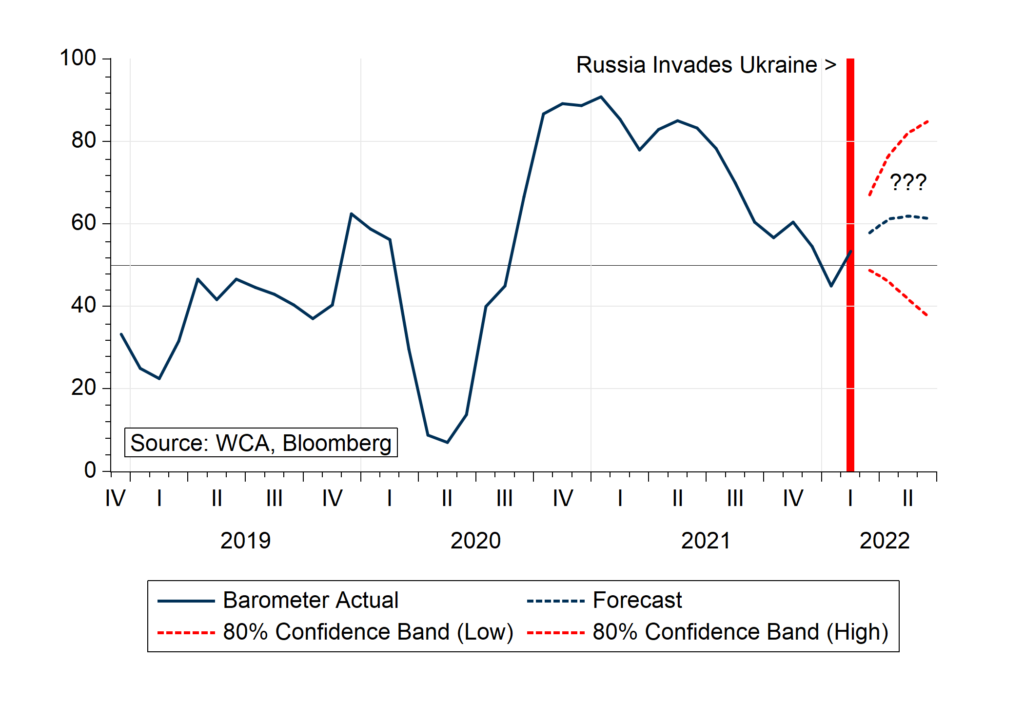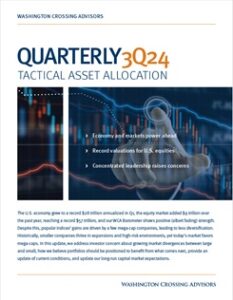Assessing Incoming Data
Our process for tactical asset allocation involves assessing data. Specifically, we assess month-to-month trends in data. When Russia began a full-scale invasion of Ukraine in late February, most of the trends we follow seemed poised to bounce. Obviously, this is no longer the case. This week we assess how recent data is influencing our outlook.
Markets React
Global financial markets are now valued at $110 trillion. And while most markets are down for the year, only a fraction of the losses occurred following the Russian’s crossing of the Ukrainian border on February 24. So, when does the market’s sell-off, which began weeks or months earlier, become a problem?
Since the February 24 invasion of Ukraine by Russian forces, the pace of market adjustment has proven reasonably orderly (outside Russia). In most markets, volatility has increased, credit spreads have widened, and inflation expectations have spiked. This is all a completely normal response to a shock. And since the Russian invasion of Ukraine is the most significant conventional military attack on a sovereign state in Europe since World War II, the recent market behavior is appropriate and understandable.
This Has to Stop
While we understand the market reaction, trends must soon start to reverse to avoid longer-lasting damage, however. For example, it would be good to see volatility measures begin to subside. The CBOE’s popular volatility index is at 36 versus 15 pre-invasion, a high but far-from-unprecedented level. It would also be helpful to see credit spreads on corporate debt level off. The yield spread on Baa corporate bonds is climbing, but far from very distressed levels. The Moody’s Baa to 10-year U.S. Treasury yield spread, for example, is now 230 basis points (2.3%) versus 170 basis points (1.7%) pre-invasion. Lastly, we are anxious to see inflation readings and expectations stop climbing, as these have important implications for policy flexibility. Consumer prices are up 7.5% year-over-year, while oil and gasoline prices are also near records, and bonds reflect surging inflation expectations ahead. Indeed, policymakers at the Federal Reserve (and politicians) are also paying very close attention to these numbers.
To reiterate, we do not view a temporary spike higher in these factors to be a significant permanent threat to the markets or the U.S. economy. We would, however, see continued upward movement in these measures to be problematic. Thus, we are monitoring the situation closely. Rising volatility, tightening credit, and a pop in inflation are ok for now. Still, for growth to continue, this will soon have to stop.
WCA Barometer Update
Given recent events, we must exercise judgment in interpreting new and rapidly changing data. Our monthly WCA Barometer (below) seemed poised for a slight bounce at the end of February. Alas, recent events make it very unlikely that next month’s update will track to the upside of the forecast range. Suppose we were to factor in the post-invasion information flow, including heavy sanctions, soaring oil prices, and volatility. What would our forecast look like then? It would almost certainly be looking to track the lower bound of the forecast path you see below.
WCA Fundamental Conditions Barometer

Tactical Posture
We exercise caution since new data strongly suggests conditions are likely to track the lower end of the forecast range below. Accordingly, we now adopt a neutral tactical allocation to equities rather than the more aggressive posture that might have made sense before Russia invaded Ukraine. We will continue to monitor and adjust tactically as more information becomes available.
WCA Fundamental Conditions Barometer:
We regularly assess changes in fundamental conditions to help guide near-term asset allocation decisions. The analysis incorporates approximately 30 forward-looking indicators in categories ranging from Credit and Capital Markets to U.S. Economic Conditions and Foreign Conditions. From each category of data, we create three diffusion-style sub-indices that measure the trends in the underlying data. Sustained improvement that is spread across a wide variety of observations will produce index readings above 50 (potentially favoring stocks), while readings below 50 would indicate potential deterioration (potentially favoring bonds). The WCA Fundamental Conditions Index combines the three underlying categories into a single summary measure. This measure can be thought of as a “barometer” for changes in fundamental conditions.
Disclosures:
The Washington Crossing Advisors’ High Quality Index and Low Quality Index are objective, quantitative measures designed to identify quality in the top 1,000 U.S. companies. Ranked by fundamental factors, WCA grades companies from “A” (top quintile) to “F” (bottom quintile). Factors include debt relative to equity, asset profitability, and consistency in performance. Companies with lower debt, higher profitability, and greater consistency earn higher grades. These indices are reconstituted annually and rebalanced daily. For informational purposes only, and WCA Quality Grade indices do not reflect the performance of any WCA investment strategy.
Standard & Poor’s 500 Index (S&P 500) is a capitalization-weighted index that is generally considered representative of the U.S. large capitalization market.
The S&P 500 Equal Weight Index is the equal-weight version of the widely regarded Standard & Poor’s 500 Index, which is generally considered representative of the U.S. large capitalization market. The index has the same constituents as the capitalization-weighted S&P 500, but each company in the index is allocated a fixed weight of 0.20% at each quarterly rebalancing.
The information contained herein has been prepared from sources believed to be reliable but is not guaranteed by us and is not a complete summary or statement of all available data, nor is it considered an offer to buy or sell any securities referred to herein. Opinions expressed are subject to change without notice and do not take into account the particular investment objectives, financial situation, or needs of individual investors. There is no guarantee that the figures or opinions forecast in this report will be realized or achieved. Employees of Stifel, Nicolaus & Company, Incorporated or its affiliates may, at times, release written or oral commentary, technical analysis, or trading strategies that differ from the opinions expressed within. Past performance is no guarantee of future results. Indices are unmanaged, and you cannot invest directly in an index.
Asset allocation and diversification do not ensure a profit and may not protect against loss. There are special considerations associated with international investing, including the risk of currency fluctuations and political and economic events. Changes in market conditions or a company’s financial condition may impact a company’s ability to continue to pay dividends, and companies may also choose to discontinue dividend payments. Investing in emerging markets may involve greater risk and volatility than investing in more developed countries. Due to their narrow focus, sector-based investments typically exhibit greater volatility. Small-company stocks are typically more volatile and carry additional risks since smaller companies generally are not as well established as larger companies. Property values can fall due to environmental, economic, or other reasons, and changes in interest rates can negatively impact the performance of real estate companies. When investing in bonds, it is important to note that as interest rates rise, bond prices will fall. High-yield bonds have greater credit risk than higher-quality bonds. Bond laddering does not assure a profit or protect against loss in a declining market. The risk of loss in trading commodities and futures can be substantial. You should therefore carefully consider whether such trading is suitable for you in light of your financial condition. The high degree of leverage that is often obtainable in commodity trading can work against you as well as for you. The use of leverage can lead to large losses as well as gains. Changes in market conditions or a company’s financial condition may impact a company’s ability to continue to pay dividends, and companies may also choose to discontinue dividend payments.
All investments involve risk, including loss of principal, and there is no guarantee that investment objectives will be met. It is important to review your investment objectives, risk tolerance, and liquidity needs before choosing an investment style or manager. Equity investments are subject generally to market, market sector, market liquidity, issuer, and investment style risks, among other factors to varying degrees. Fixed Income investments are subject to market, market liquidity, issuer, investment style, interest rate, credit quality, and call risks, among other factors to varying degrees.
This commentary often expresses opinions about the direction of market, investment sector, and other trends. The opinions should not be considered predictions of future results. The information contained in this report is based on sources believed to be reliable, but is not guaranteed and not necessarily complete.
The securities discussed in this material were selected due to recent changes in the strategies. This selection criterion is not based on any measurement of performance of the underlying security.
Washington Crossing Advisors, LLC is a wholly-owned subsidiary and affiliated SEC Registered Investment Adviser of Stifel Financial Corp (NYSE: SF). Registration with the SEC implies no level of sophistication in investment management.



